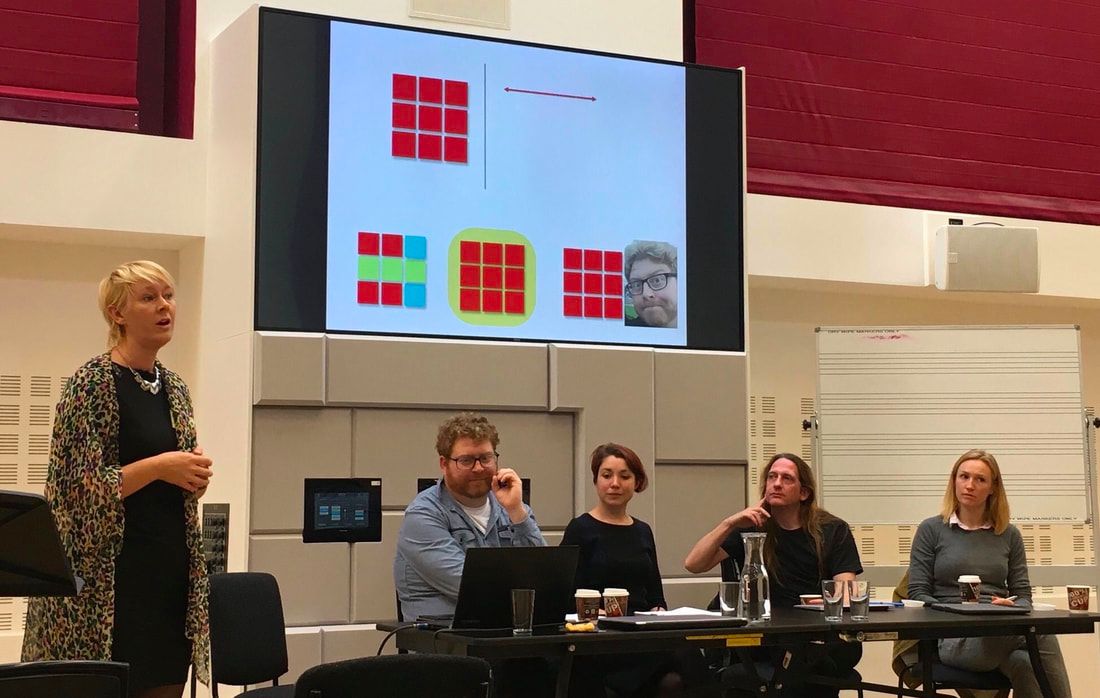 Round Table Panel at the Royal Musical Association. (from left to right, Dr Michelle Philips (RNCM), Dr Matthew Sergeant (Bath Spa University), Dr Lauren Redhead (Goldsmiths University, London), Dr Luke Jones (DNEP, UoM), Abigail Conner (Philosophy, UoM). Round Table Panel at the Royal Musical Association. (from left to right, Dr Michelle Philips (RNCM), Dr Matthew Sergeant (Bath Spa University), Dr Lauren Redhead (Goldsmiths University, London), Dr Luke Jones (DNEP, UoM), Abigail Conner (Philosophy, UoM). Dr Luke Jones was an invited member on a round table panel at the 55th Annual Conference of the Royal Musical Association. The conference was held at the Royal Northern College of Music, 11-13th September 2019. The theme of the session was Music and Time Psychology: Philosophy and Practise. The panel was chaired by Dr Michelle Phillips (RNCM), and the other panel members were Abigail Conner (Philosophy, University of Manchester), Dr Lauren Redhead (Musicology, Goldsmiths University, London), Dr Matthew Sergeant (Composer and Lecturer, Bath Spa University, UK), Dr Joel Smith (Philosophy, University of Manchester). Each panel member was asked to reflect on the topics of memory, duration, the present, subjective and objective, before opening to questions from the audience. The members of the panel are currently working on a book titled Music and Time: Psychology, Philosophy and Practice, to be published by Boydell & Brewer.
9 Comments
The second semester of 2019 turned out to be a hectic one, and we haven't updated our news on here for a while, so here's a catch up of a few things. In February our PhD student Emily Williams passed her viva voca and became Dr Emily Williams. Emily's graduation was in July and it was a lovely day, the photo below shows Emily with her two supervisors Dr Luke Jones (me) and Dr Andrew Stewart. It was a really proud day, but also tinged with sadness, Emily as been such a major force not only in our lab but in our school, and it has been a five year journey from supervising her 3rd year undergraduate project, master's dissertation (MRes), through to the challenges of securing her PhD funding. We are still working on papers together, and Emily will always be part of our lab. Thanks for everything Emily, you made the University a better place to work in. In April the University of Manchester hosted the spring meeting of the Experimental Psychology Society. Our lab was well represented with Emily giving her first EPS oral presentation (on our work on temporal difference thresholds and repetitive stimulation) and also a poster (on repetitive stimulation and physiological arousal). In non-Emily news... the first paper from our 3 year ESRC funded project on timing and autism is now out. This paper like the project is a collaboration between the time lab and autism research at Manchester, and it also forms part of the thesis of our PhD student Martin Casassus. The paper is a systematic review of timing studies in autism, a link to the online (open access) version of the paper is HERE. The main takeaway message is that although problems with 'time' are commonly reported by people with autism (or their friends and family), exactly what kind of timing this relates to is unclear, and in the literature any significant deficits in fundamental stimulus timing have yet to be proven, the evidence for deficits in more complex timing tasks is somewhat stronger. Addressing these issues is the purpose of our ESRC project, and we will have empirical papers on this coming out over the next year. Now the summer is here our main activities are paper writing, but we will soon have the first batch of data from our large scale study of performance on various timing taks by people with autism, which is very exciting! Our planned analyses have all been pre-registered and we are aiming for a gold standard in open science practices relating to this (and all) outputs from our lab.
Lastly we end on a rather sad note, recently Dr Don O'Boyle passed away from a long illness. Don was a lecturer in the psychology department here up until 2003, he had a keen interest in timing research (especially in relation to Parkinson's Disease) and was a co-supervisor of my (Luke Jones) PhD. Don was a true scientist, scholar and a generous mentor. Don showed me a lot of kindness and patience when I first came to Manchester and had not a clue what I was doing! Rest in peace Don, our love goes out to his friends and family. Emily Williams our PhD student passed her viva (oral exam) on her thesis on the 18th January!
Emily's external examiner was Dr William Skylark from Cambridge University (https://www.psychol.cam.ac.uk/people/william-j-matthews) and her internal examiner was Dr Jason Taylor (https://www.research.manchester.ac.uk/portal/jason.taylor.html). We are very grateful for both of them taking the time and effort to do this role. According to the examiners' report Emily performed brilliantly in her viva and the examiners were so interested in her work that the exam went on for nearly 3 hours (which caused some stress to her supervisor pacing the corridor outside - i.e. me! - Luke Jones). Emily will graduate in July this year which we are looking forward to. Emily is already working in a postdoctoral research position in Leeds (see below for her blog post about it). Thank you to everyone who gave help and support to Emily during her PhD, and especially to Dr Andrew Stewart who was her co-supervisor along with myself. 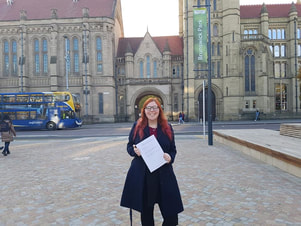 Hi everyone, Emily here, and I've been invited to write a guest blog post about my recent developments. In the past few months I have submitted my PhD thesis, started a postdoc, and had my first first-author paper published online! My thesis, Investigating the Pacemaker Component of the Human Timing System, presents three original works that aim to test the 'pacemaker' explanation of timing, put forward by Scalar Timing Theory. You can read the abstract of my thesis by clicking here. I'm looking forward to discussing my work during my Viva in January, and will most likely graduate in July 2019. In September I started my new role as a Postdoctoral Research Fellow at the University of Leeds. I'm working on the Helping Handwriting Shine (HHS) programme, the world's largest randomised controlled trial of a handwriting intervention. You can find my new staff page here! My previous outreach and widening participation work led to a firm interest in increasing the educational attainment of young learners, regardless of background. I was interested in this handwriting postdoc because the HHS intervention aims to free up the cognitive resources of slow and effortful handwriters, to help them achieve. Finally, I am pleased to announce that the first paper from my PhD has been published this week, in Attention, Perception, & Psychophysics. You can read the first page of the article, Modality Differences in Timing and the Filled-Duration Illusion: Testing the Pacemaker Rate Explanation, below or read the full version online here (open access). I'm looking forward to working with Time Lab Manchester in the future as an external collaborator! Emily A. Williams Today was a mixture of celebration and sadness as our team member Hailey (Hui Wen Chong) graduated from her MSci Biology with a first class mark. Hailey will be returning to Singapore tomorrow and starts a new job in September.
We would like to thank Hailey for all her hard work over the last two years, and for being such a fun and professional member of our time lab. We wish her good luck for the future, we will miss you!
On Tuesday 10th April members of our time lab attended the What's Time? event at Google Digital Garage in Manchester. The event was organised by the Institute of Physics in conjunction with The Royal Northern College of Music (RNCM) the Manchester Time Lab and Google. The event kicked off with two musicians from RNCM (a piano player and a flautist) playing four very different piece of music. The piano played was the Google Manchester Piano, which displays a different image of Manchester depending on which note is played! The audience members were asked which piece of music they thought lasted the longest. Dr Michelle Phillips from RNCM then gave a talk about time and music, and the different aspects of a piece of music (and the listener) that can affect the perception of its duration. Following on from this Dr Luke Jones from our time lab gave a talk which was a general introduction to the field of time perception, followed by a Q & A. Lastly Dr Hannah Renshaw from the Institute of Physics gave a talk on the physics of time. The event also involved experiments that the people could take part in, one experiment was investigating the perception of the duration of different types of music, the other was exploring people's mental imagery for time. We are very grateful to our PhD student Emily Williams for helping out with the experiments in what turned out to be a very busy evening.
Many thanks to everyone that attended, the lovely friendly people at Google, and all who organised the event.
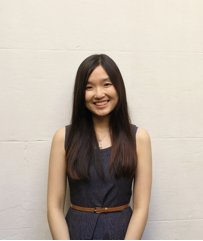 A very warm welcome to Ms Hui Weng Chong (a.k.a Hailey) who has joined our lab. Hui Wen (Hailey) is a final year MSci Biology student at the University of Manchester, supervised by Dr Luke Jones. Hui Wen has a vast interest in many disciplines of biological research, as seen from her previous summer placements. She was a research assistant in Prof. Wong’s Pathology Lab at University Malaya Medical Centre in 2015 to assist on on-going researches such as Alzheimer’s Disease and Japanese Encephalitis. Later, she worked in Prof. Takano’s Lab to invent a sweat alcohol biosensor ‘AlcoPatch’ as part of the International Genetically Engineered Machine (iGEM) Competition 2016. Her boldness in trying new things has also led to her first publication in identifying gene polymorphisms associated with Schizophrenia using a bioinformatics approach. Hui Wen’s current core interest revolves around time perception and the effects of modality on perceptual duration judgements in Working Memory.  Congratualtions to our postgraduate student lab memeber Jessica Henderson, who has been employed for a RA post at Liverpool John Moores University. The project is examining sympathetic and parasympathetic activity and the effect it has on time perception. In particular, it hopes to assess if sympathetic activity, induced by stress, leads to over estimation during a time-based task and if parasympathetic activity, induced by mindfulness, attenuates this effect. The project is funded by the Bial Foundation and the grant holder is Dr Ruth Ogden. Jessica is currently completing an MRes Psychology supervised by Dr Luke Jones. |
Who We are
The Time Perception lab is located in the University of Manchester. For more details see our 'About' page. Archives
May 2023
|
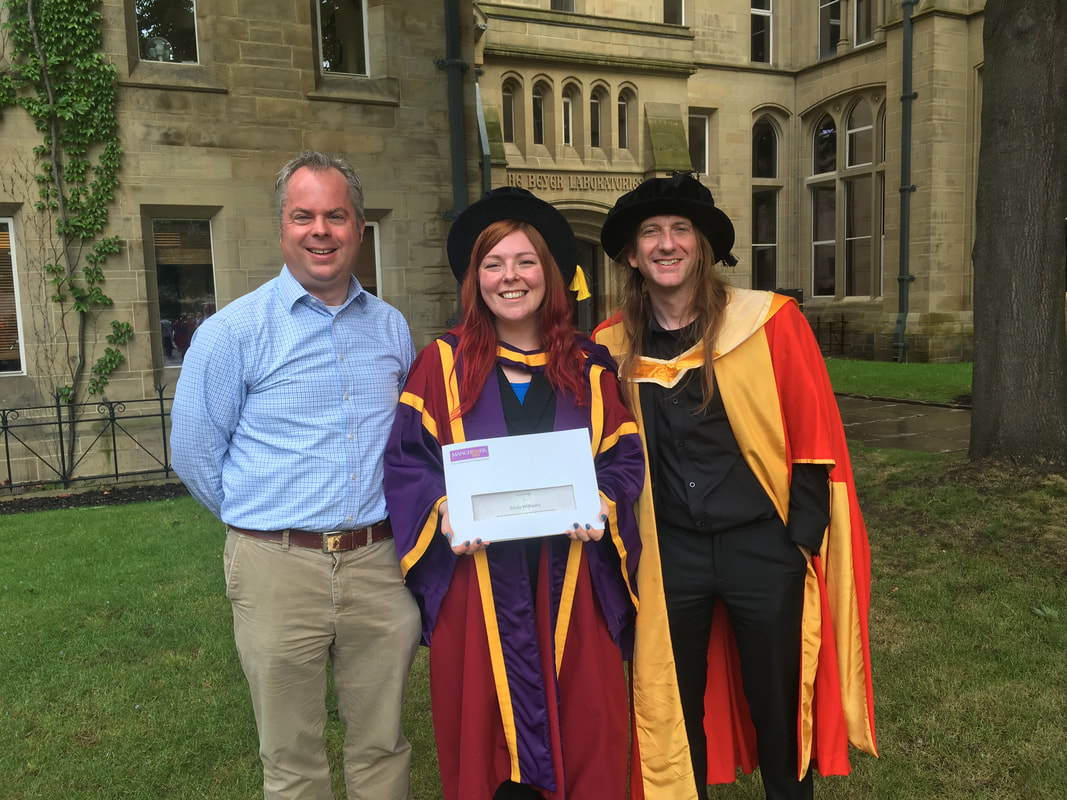
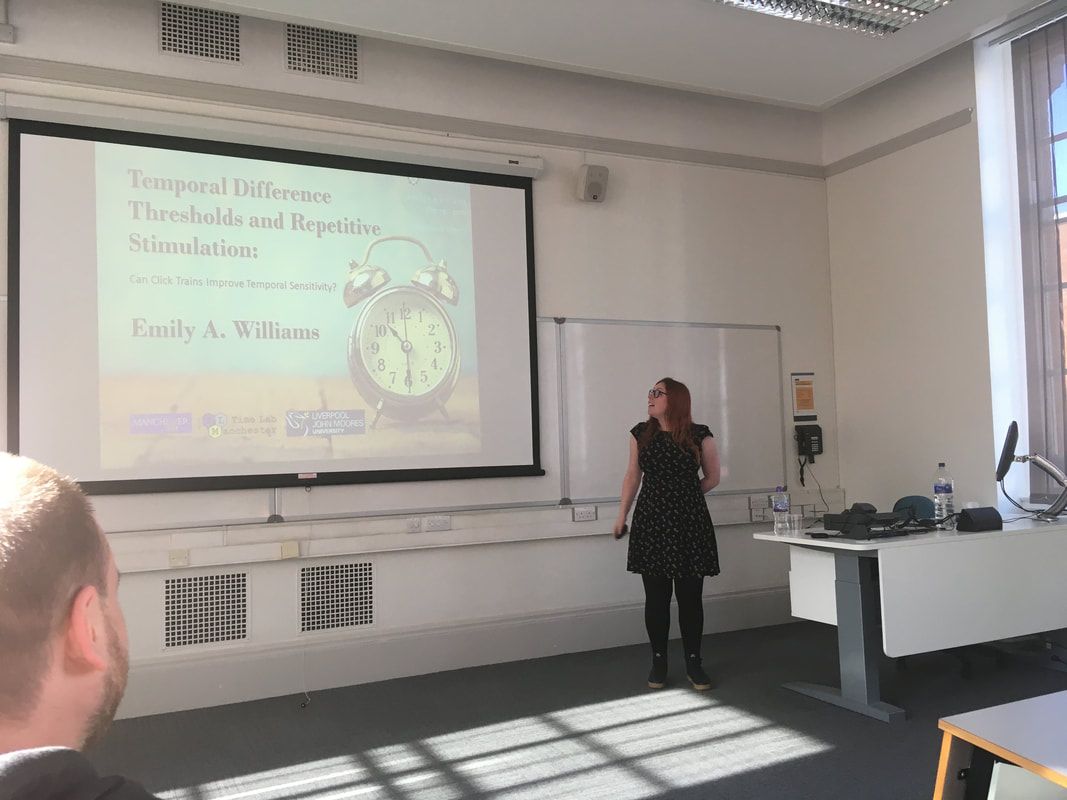
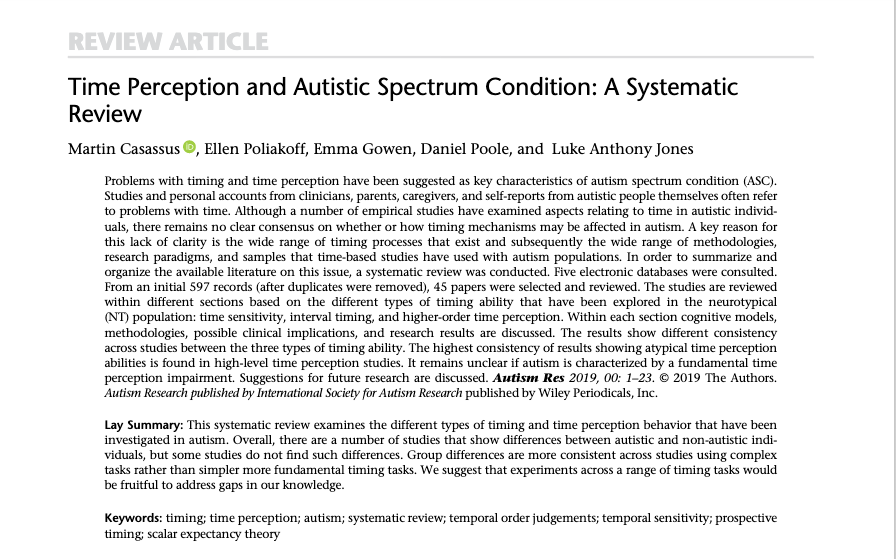
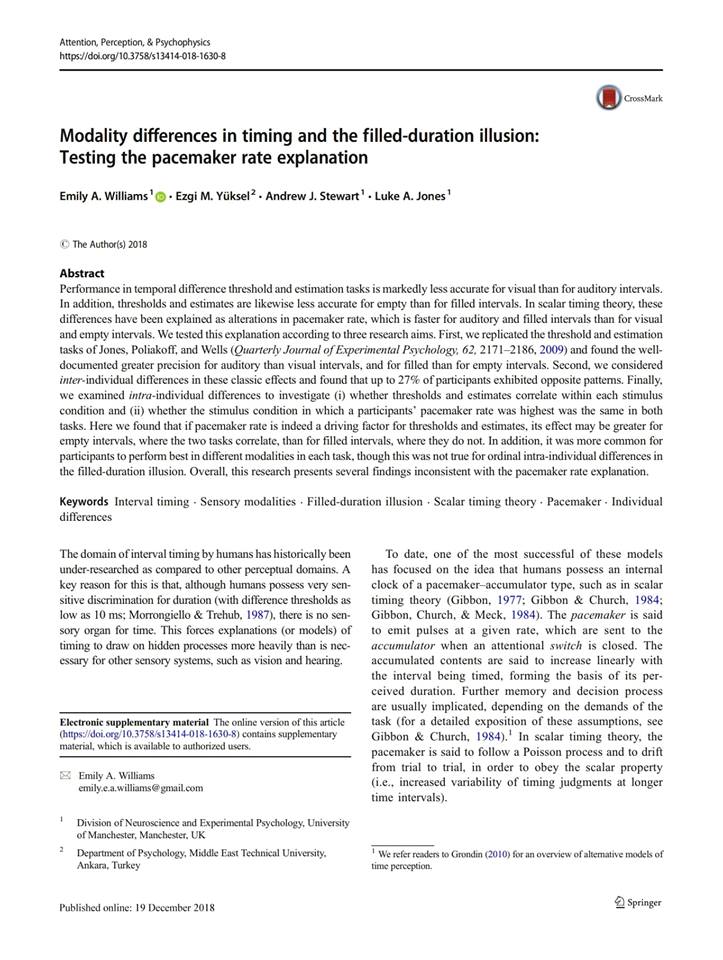
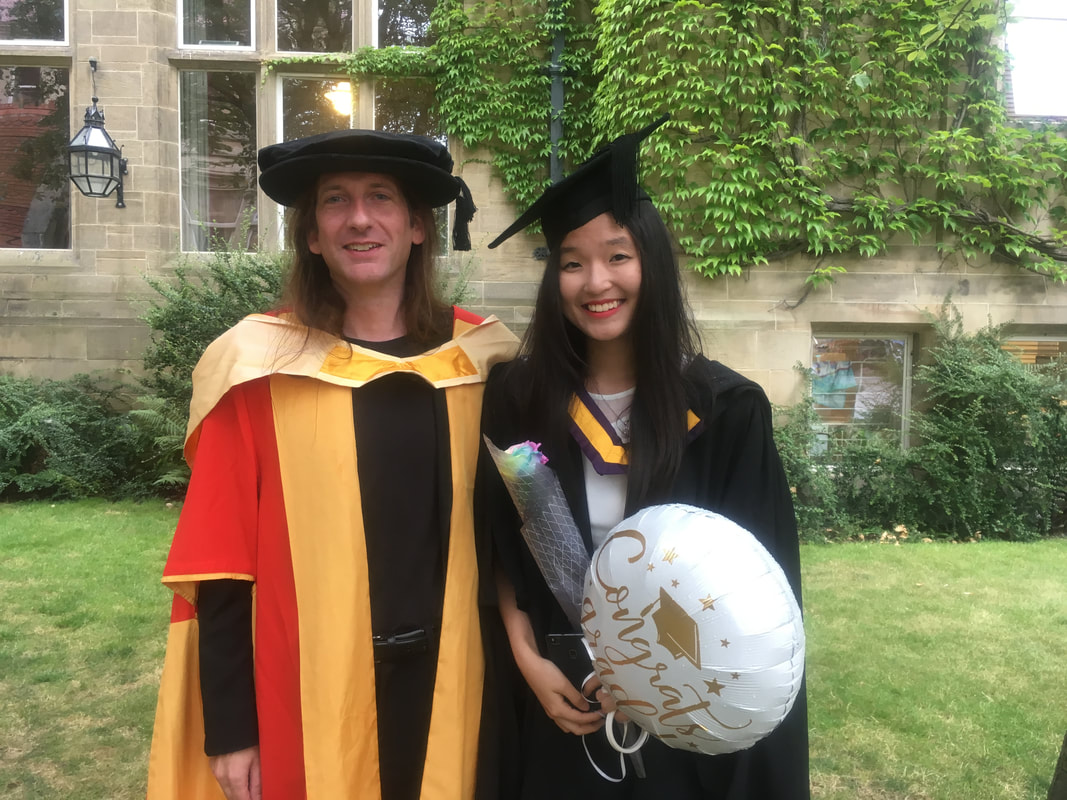
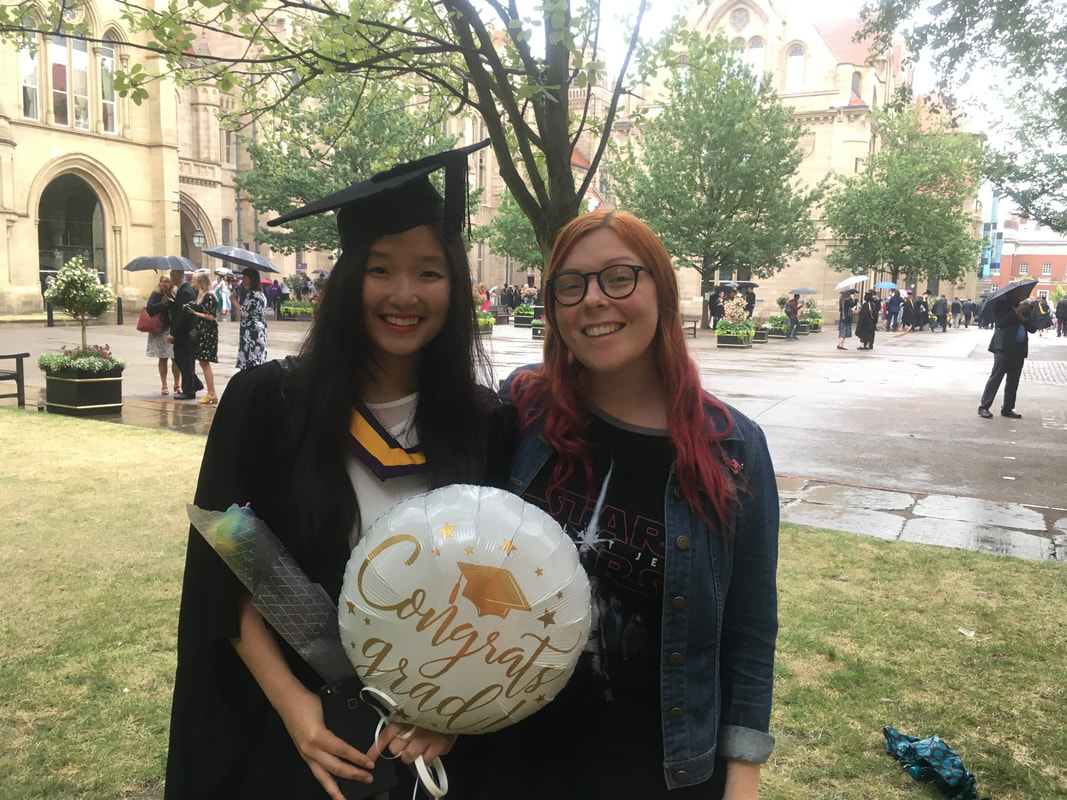
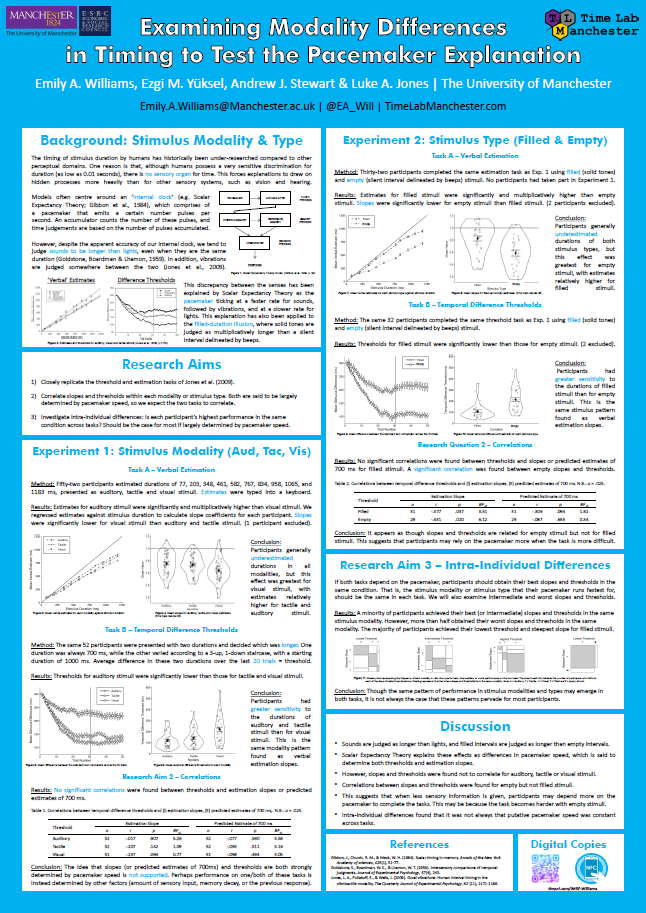
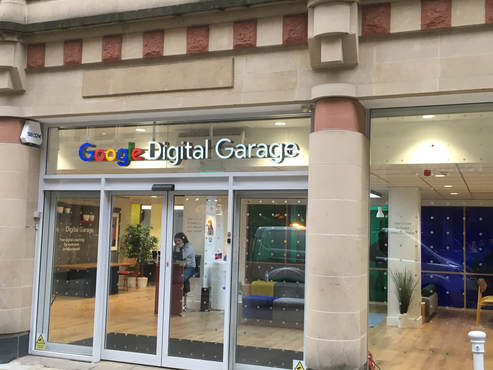
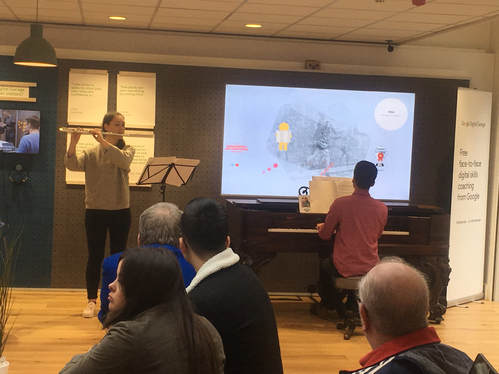
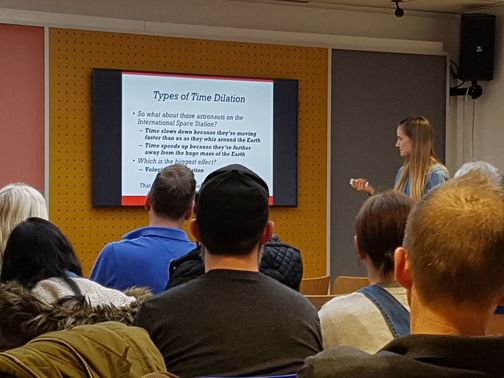
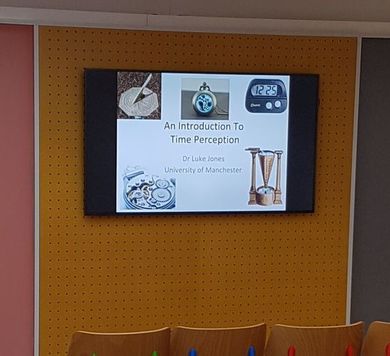
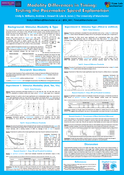
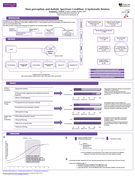
 RSS Feed
RSS Feed
